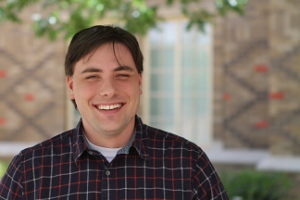
STEPHEN SACCO
Special to the Leader
Dr. George David Clark was born in Savannah, Ga., but moved from time-to-time while growing up in the southeast of The United States. He was raised by his father, a pastor, and his mother, a teacher just like himself.
Clark talked about his roots in English literature and poetry in conjunction with his family.
“[There was] very little poetry in my house growing up, but lots of fiction . . . reading was always a big part of their lives,” he said.
It would take awhile for Clark to develop his passion for poetry, but he found a natural love for stories and writing at a very young age.
“‘The Chronicles of Narnia’ . . . those were some important books . . . [ I read] ‘The Hobbit’ and ‘The Lord of the Rings’ books when I was little and not wanting to go at recess,” he said.
“Everybody else [was] going out to play and I remember thinking, I really wish I [could] read right now. Like you’re right inside the middle of an exciting part of the book, and you don’t want to stop,” he continued. “So that’s what I think of when I think of early powerful experiences from books.”
Clark vividly recalls being out on recess and wanting to read instead of playing games and swinging on monkey bars.
His love of reading sparked his writing.
“When I was little, since I love books some much, I would write little stories and things like that,” he said.
Now, as an adult, he has seen this passion passed down to his four children.
“My own kids do this now,” said Clark. “They write stories, as they are learning to write. They are willing to engage into storytelling themselves, as they’re reading stories they like.”
Clark didn’t gain interest in poetry until after he graduated from high school.
“I couldn’t have cared less about poems until college,” he said. “I didn’t read much poetry at all certainly not contemporary poetry.”
So what was it that sparked Clark’s interest in poetry?
He recalls taking a creative writing class his freshman year. The very first poet that Clark gained inspiration from, specifically, was Elizabeth Bishop.
“I remember we read ‘The Fish,’ ‘The Mothman’ and ‘Crusoe in England’ . . . [they] are highly narrative and had a story which drove the drama . . . ” he said. “It wasn’t just the narrative content driving these poems but the sonic content . . . they had this sort of physical thrust behind the language.”
Clark explained many of his inspirations in two lectures here at SUNY Fredonia.
